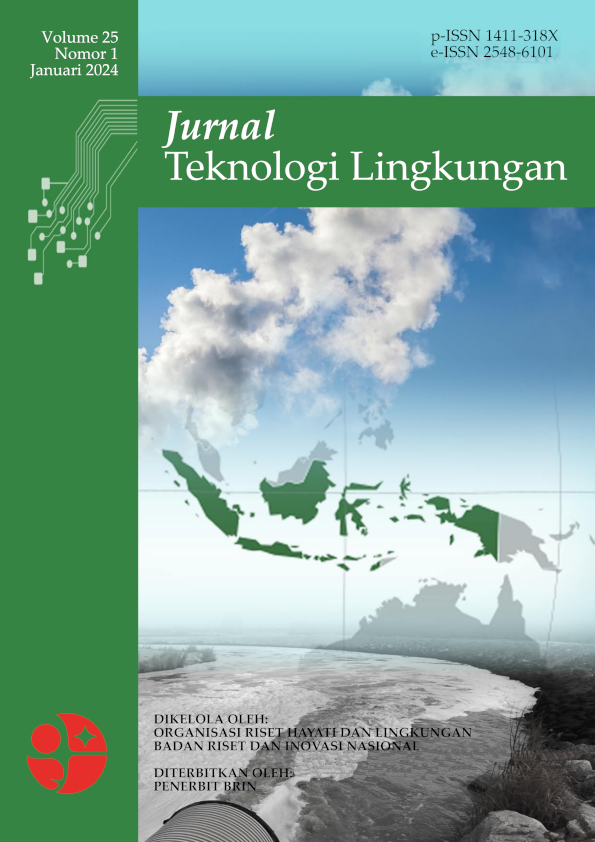Assessing the Environmental Footprint: A Life Cycle Assessment of Greenhouse Gas Emissions from Energy Consumption in 3 and 4-Star Hotels in Pontianak, West Kalimantan
Main Article Content
Abstract
Persebaran usaha penginapan di Indonesia hingga tahun 2021 terus meningkat, di mana 48,95% merupakan hotel berbintang. Pada operasionalnya, hotel memerlukan energi dari berbagai jenis bahan bakar yang menghasilkan emisi berupa gas rumah kaca. Studi ini dilakukan pada kasus di Hotel X (bintang 4) dan Hotel Y (bintang 3) di Kota Pontianak, Kalimantan Barat yang menggunakan energi dari batubara, gas alam cair, dan bahan bakar minyak. Tujuan penelitian ini adalah untuk menganalisis dampak lingkungan dari gas rumah kaca menggunakan metode analisis daur hidup. Data inventori dilakukan terhadap jenis sumber energi, jumlah alat, dan lama penggunaan pada tiap fasilitas yang tersedia di hotel. Aplikasi OpenLCA 1.11.0 dan database CML-IA baseline digunakan untuk menganalisis dampak lingkungan yang dihasilkan. Kategori dampak yang dianalisis yaitu potensi dampak pemanasan global, penipisan abiotik, dan potensi oksidasi fotokimia. Dampak lingkungan terhadap pandemik COVID-19 dan strategi manajemen gas rumah kaca juga didiskusikan. Hasil penelitian menunjukkan bahwa jumlah tamu, fasilitas dan jenis bangunan berpengaruh pada emisi yang dihasilkan. Jumlah tamu pada tahun 2020 merupakan jumlah terkecil dibandingkan tahun 2019 dan 2021, yang sejalan dengan jumlah konsumsi energinya. Jumlah fasilitas pada Hotel X yang lebih banyak dibandingkan Hotel Y juga menyebabkan Hotel X menghasilkan lebih banyak emisi dibandingkan Hotel Y. Rekomendasi dari penelitian ini berupa perencanaan strategi pengelolaan konsumsi energi yang lebih baik, terutama pada penggunaan lampu dan pendingin ruangan. Untuk mengurangi konsumsi energi dari penggunaan alat tersebut dapat diterapkan sistem sensor untuk aktivasi listrik, serta penggunaan elektronik dengan daya yang lebih rendah. Diharapkan hasil riset ini dapat memberikan solusi bagi perencanaan strategi pengelolaan energi yang berkelanjutan di hotel berbintang dan diperlukan inventarisasi detail untuk mengetahui dampak lingkungannya secara komprehensif.
Abstract
The distribution of Indonesia lodging businesses in 2021 has been continuously increase, with 48.95% being star-rated hotels. In their operations, hotels require energy from various types of fuels that produce emissions in the form of Greenhouse Gases. This study was conducted on the cases of X Hotel (4-star) and Y Hotel (3-star) in Pontianak, West Kalimantan, which utilize energy from coal, liquefied natural gas, and oil fuels. The research objective is to analyze the environmental impact of greenhouse gases using the life cycle analysis method. Inventory data were collected for the types of energy sources, the number of appliances, and the duration of usage for each facility available in the hotels. OpenLCA 1.11.0 application and CML-IA baseline database were employed to analyze the resulting environmental impact. The impact categories analyzed include the global warming potential, abiotic depletion, and photochemical oxidation potential. The environmental impact of the Covid-19 pandemic and greenhouse gas management strategies are also discussed. The research results indicate that the number of guests, facilities, and building types influence the emissions produced. The number of guests in 2020 was the smallest compared to 2019 and 2021, correlating with the energy consumption. The higher number of facilities in X Hotel compared to Y Hotel also results in X Hotel producing more emissions than Y Hotel. Recommendations from this research include better planning for energy consumption management strategies, especially in the use of lighting and room cooling. To reduce energy consumption from lighting and air conditioning, the implementation of sensor systems for electrical activation and the use of electronic devices with lower power consumption can be applied. It is hoped that the findings of this research can provide solutions for sustainable energy consumption management strategies in star-rated hotels, and a more detailed inventory is needed to comprehensively understand its environmental impact.
Article Details

This work is licensed under a Creative Commons Attribution-ShareAlike 4.0 International License.

